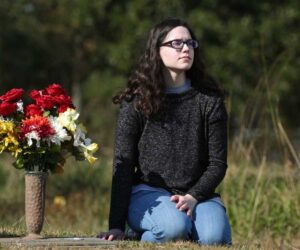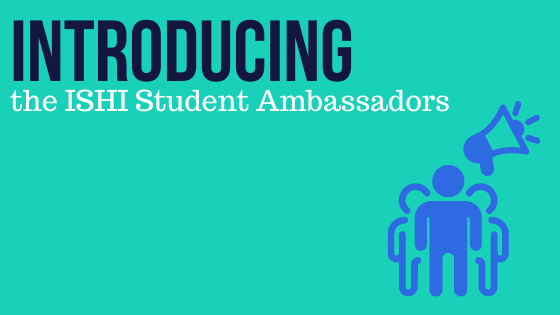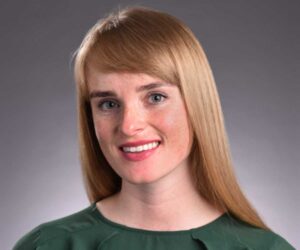We know that it takes a special kind of person to choose forensic science as a career, and this year, we’d like to recognize a few of the students who are making a difference in the field. We’re excited to introduce this year’s ISHI Ambassadors! These students are all pursuing degrees in the field of forensics. They will be participating in this year’s 32nd International Symposium on Human Identification in Orlando. Follow Olivia, Nidhi, Amber, and Haley on social media as they share highlights from the ISHI workshops, presentations, and poster sessions. We’ll also hear about the fun moments in between the scientific sessions including the Welcome and Wednesday Night Events. We look forward to seeing the meeting through their eyes, and learning more about their research and career aspirations.
Olivia McCarter – Anthropology Major with a focus in Biological Anthropology, University of South Alabama

Like many people my age who are in school for a forensic science career, I grew up watching TV shows that portrayed these characters who were important members of the forensic science community. At the age of thirteen, I decided that I wanted to be a forensic anthropologist, which I am in school for now. When I was eighteen, I got an internship to do forensic investigative genealogy with two pioneers in the fields–Anthony and Lee Redgrave. I was on a team that identified a man that washed up in the Missouri River in 1979 back in April of 2020. I was so taken aback by my emotions about this man whom I had never met and what had happened to him–and I realized that this was one of the greatest things I will ever do in my life. We gave this man back to his awaiting family, who had loved him and had been missing him. The moment that we solved that case , I knew that I was born to work forensic science. After I get my PHD in forensic anthropology, I want to work for law enforcement, either at a state crime lab or the FBI, to help identify the 40,000 unidentified remains in the United States.
Attending ISHI will be a great opportunity for me to learn from different workshops, hear different presentations, and show everyone from my own presentation that I have a place in the forensic science community. I expect that attending ISHI will have a positive impact on my career growth, as I can meet people from all over the world and show them what I can do.
My forensic science poster will be about infanticide (killings of children under the age of four) and how forensic genetic genealogy is an important factor of giving them their identities back and arresting the individual(s) who ended their short lives. I have been on a few infanticide cases (including the identification of an eighteen-month old toddler found in Pascagoula, Mississippi) and genetic genealogy is one of the only ways to get these children justice, because it is extremely hard to identify them without the use of genealogy. That is because they are children and haven’t really left a footprint of this earth. Especially in cases of newborns, no one could know that they exist. No one could have known their mother was pregnant. In the Pascagoula, MS case–this child had been known to her family. The child and her mother (also killed) had traveled to Florida to start a new life with her mother’s boyfriend. They had never been out of their home state of Missouri before then. That means that no one in the area where she was found knew who she was or who her parents were. In this case, law enforcement officers had been searching for her identity for thirty-eight years before they asked us to identify her–and we had an identity in fifty-two days. It is the same for a lot of infanticide cases. I would like to show the importance of the use of forensic genetic genealogy within these types of investigations.
Follow OLIVia on INSTAGRAM or TWITTER or connect with her on LINKEDIN.
Nidhi Sheth, Center for Computational and Integrative Biology/Forensic Science, Rutgers University
At a young age, I decided to pursue a career in criminology after being inspired by my grandfather, a renowned criminal lawyer in Gujarat, India. Hearing stories about his most challenging and convoluted cases captivated me and profoundly influenced my decision to pursue a career in forensic science. To become proficient in the fundamental technological aspects of the field, I pursued a B.S. in Pharmacy from Nirma University, India. Concurrently, I pursued extracurricular social activism, and I was selected as the Gujarat State Representative to present my views on “Preventing Crime Against Women” at the Indian Student Parliament to an audience of over 80,000 people. I opened the event with a discussion on the importance of implementing new educational policies to end the disparity between men and women in the eyes of India’s justice system. This experience cemented my commitment to criminal justice, science, and higher education.
Receiving recognition for a job well done is not what matters to me: I believe working in this field is about securing justice for the voiceless. With the purposeful aim of improving society, I decided to further my knowledge in the field of forensics by acquiring my M.S. in Forensic Science from Pace University. One day, during a crime scene investigation and reconstruction class, I asked my professor if menstrual blood could be differentiated from peripheral blood. Impressed with my line of questioning, my professor introduced me to Dr. Donald Siegel at the New York City Office of Chief Medical Examiner, where I was offered an internship. During my time at the OCME, I explored different methodologies towards finding a plausible solution to the question I had originally posed. Being successful in my inquiry, and I presented my work on differentiating menstrual and peripheral blood using stem cells at the Northeastern Association of Forensic Science Conference in October 2017. Pace University recognized my dedication, initiative, and persistence in investigating an original idea with two prestigious awards, which I was honored to accept: The Excellence in Forensic Science Research Award, and Career Service Student Award.
I was encouraged by these successes to pursue advanced technical and research training, so I chose to enroll for a Ph.D. at Rutgers University. Working under the supervision of Dr. Catherine Grgicak in the Laboratory for Forensic Technology Development and Integration, I have become privy to the sources of variation associated with bulk DNA mixture interpretation, and I became keen to solve this issue for the most complex samples. With thanks owed to the invaluable help of my lab group and ongoing support from Dr. Grgicak, I received a graduate research fellowship award from the National Institute of Justice. This opportunity has allowed me to pursue my education and research in the field of forensic DNA analysis while working toward developing a forensically relevant single-cell pipeline.
In the future, I hope to apply my educational and professional experience toward becoming a Crime Laboratory manager. I look forward to spearheading projects that incorporate policy changes and using innovative techniques, such as single-cell methodology, for the betterment of society. I also aspire to join forces with my home country, India, to introduce more young people to the field of forensic science so that we may all work together to reduce crime against women and against society as a whole.
While presenting at the ISHI conference, I will discuss with attendees the incredible potential associated with single-cell pipelines for solving complex DNA mixture problems. This vein of research could eventually help the forensic science community tackle the interpretation and inference of complex mixture samples and the activity-level propositions thereof. Presenting my work and engaging with the forensic science community at ISHI will provide me an incredible platform to collaborate with practitioners and researchers in the field of DNA analysis.
Since a very young age, my career aim has been dedicated to providing justice for the voiceless. The opportunity that ISHI provides to nominate a student ambassador will serve as the perfect platform for me to connect with renowned forensic scientists on the national level, and even to connect with the forensic community globally. Connecting with the forensics community will tremendously benefit my research and will expand my Ph.D. education, bringing me one step closer to my goal: making the world a more just place.
Follow Nidhi on INSTAGRAM or TWITTER Or connect with her on LINKEDIN.
Amber Vandepoele – Biochemistry BS and Forensic Science BS, Syracuse University
My interest in forensic science began when I took my first forensic science course in high school. From there, I searched for a university that would allow me to explore my interest in forensic science while also providing me with a rigorous scientific course load. After learning about the groundbreaking research at Syracuse University’s Forensic and National Security Sciences Institute and its partnerships with leading companies and agencies in the field, I knew it was where I would be able to grow and develop the skills needed for a career in forensic science. During my first semester at Syracuse, I joined Dr. Marciano’s bioforensics lab on campus, the first freshman to do so. Through three years of bioforensics research, I have discovered my passion for forensic science and specifically DNA analysis. Through a career as a DNA Analyst, I will be able to combine my love for science and passion for justice while continuing to learn, teach others, and work through complex problems. I hope to use my knowledge and skills to provide unbiased analysis of evidence which will help seek justice and provide comfort for victims and families. Simultaneously, I hope to foster the interest of women, BIPOC students, and other underrepresented and marginalized groups in STEM and empower them in their pursuit of academic and professional careers in STEM.
Attending ISHI will be a great opportunity to build on my academic knowledge, further pursue my passion for forensic science, and learn from practicing scientists and professionals in the field. I hope to gain more knowledge of the field by attending workshops and panels, and thus working towards my goal to provide and improve global justice. I further hope to gain valuable insight from professionals that can be incorporated into both my research and overall career path. Also, I will present my research at ISHI and hope to grow more comfortable with public speaking through a poster presentation of my work. Practicing scientists can provide valuable insight on my research project and discussions can allow new research ideas to emerge.
My poster will be about my bioforensics research titled “Phylogenetic Differential Separation of Environmental Samples: The First Step in Improving Mixed Species Sequencing Results.” In forensic science, when genetic identity is in question the choice is often to target one species in a sample, for example human DNA. However, it may be advantageous to characterize multiple species as they can be used to provide probative information about the potential crime or event of interest. For example, microbial profiles can serve as a tool for individualization and can include or exclude a suspect from a crime scene. Therefore, my study aims for the optimization of a method to separate bacterial, plant, and human cells in a mixed sample using pre-extraction cell size filtration and post-extraction sequence capture. This separation method will allow complex DNA samples to be interpreted more easily, and thereby maximizing the amount of genetic information that can be gleaned.
I am grateful for this opportunity and I hope to learn more about how I can become a successful forensic scientist, and support the field in improving global justice.
Follow Amber on INSTAGRAM or TWITTER or connect with her on LINKEDIN.
Haley Falling – Master of Science in Forensic Science, Towson University
There I was, a college freshman being bombarded with possible majors, minors, future careers, and zealous student organization leaders on the first day of class. Having just graduated high school and spent a summer lifeguarding at my hometown’s community pool, I had no idea what my future might hold, so how could I decide what I would spend the rest of my life doing? Instead of fretting, which was my usual habit, I quickly signed up for the most interesting major available: forensic science. Little did I know then, I had committed myself to a program which would shape me into a professional and help me to find my vocational purpose.
My undergraduate coursework in forensic science challenged and inspired me as I learned the ropes of drug chemistry, genetics, and crime scene processing. Similarly, the liberal arts education I was receiving challenged and inspired inspired my core beliefs, particularly in regard to my education on human dignity. The understanding that there is intrinsic, undeniable dignity found within each person informed my undergraduate experience, as well as my approach to forensic science; every attempt on a human life was an attempt to disregard the dignity and humanity found within that person. Therefore, I found that forensic science not only served the objectives of criminal justice, it served justice itself. Forensic science confirms the value of a life by simply seeking the truth.
While it is clear that the field of forensic science is often a thankless one, full of tedious work, intellectual research, and a commitment to scientific objectivity, it is also an incredibly valuable field. Forensic science offers an opportunity for constant improvement, through new technologies, institutional research, and advances in scientific understanding. Most importantly, I know that this is a field in which I can make a true contribution to my community and to justice. So while I may fail to receive recognition for the work I perform, I will know that my dedication mattered in the course of justice. To paraphrase one of my professors, the people sitting in a courtroom might not understand how important your contribution was to the case at hand, but you will know that your hard work and intellect allowed for the truth to be discovered.
One of the best things about the forensic science field is its omnipresent opportunity for intellectual growth. While I entered graduate school thinking I would have a career in crime scene processing, I quickly realized that there were other areas in which I could gain experience and find passion. Indeed, another area did present itself: forensic biology and DNA analysis. During my time at Towson University, I have gained hands-on experience at the Towson Human Remains Identification Laboratory (THRIL) in STR analysis using capillary electrophoresis as well as STR, mitochondrial DNA, and SNP analyses using next generation sequencing. As an ISHI Student Ambassador, I would present a scientific poster discussing these research endeavors.
Because of the inspiration and passion I have found in human DNA research, I plan to pursue a career as a forensic DNA analyst. One of my long-term goals in forensic science is to achieve a Ph.D. and research historic and ancient DNA using sequencing technologies to determine biogeographical information, phenotypic information, and possible kin relationships among recent, historic, and/or ancient human remains, such as those often unearthed during new construction. In doing so, I hope to confirm the dignity and value of those individuals lost to violence or history.
I plan to attend the 2021 ISHI at Disney’s Coronado Springs Resort, where I hope to gain further insight into the field of forensic DNA analysis from our nation’s leading scholars and professionals. I also hope to gain a larger network of colleagues at ISHI so that I may continue to learn and build relationships with others who are passionate about forensic DNA technologies. I plan to use my participation experience at ISHI as a catalyst for other graduate students to attend forensic science conferences by sharing my experiences with my fellow classmates and with other young professionals and students via social media.
As I continue to pursue my passion for forensic DNA analysis, I firmly believe that having participated at the 2021 ISHI as an ISHI Student Ambassador will remain a significant experience in my development as a forensic scientist. I hope that my experience as an ISHI Student Ambassador would inspire other students and young professionals to join a field which vigorously pursues truth, justice, and excellence.
Follow Haley on INSTAGRAM or connect with her on LINKEDIN.
WOULD YOU LIKE TO SEE MORE ARTICLES LIKE THIS? SUBSCRIBE TO THE ISHI BLOG BELOW!
SUBSCRIBE NOW!





